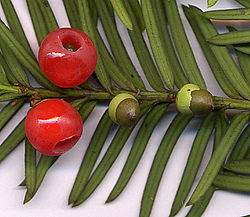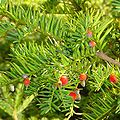
| Home | Sources Directory | News Releases | Calendar | Articles | | Contact | |
Aril
- Distinguish from aryl, which is a type of organic chemical radical.
An aril (or arillus) is any specialized outgrowth from the funiculus (attachment point of the seed) (or hilum) that covers or is attached to the seed. It is sometimes applied to any appendage or thickening of the seed coat in flowering plants, such as the edible parts of the mangosteen and pomegranate fruit, the mace of the nutmeg seed, or the hairs of a cotton plant.
The aril may create a fruit-like structure (called a false-fruit). False fruit are found in numerous Angiosperm taxa. The edible flesh of the longan, lychee, ackee and lleuque fruits are highly developed arils surrounding the seed rather than a pericarp layer. Such arils are also found in a few species of gymnosperms, notably the yews and related conifers. Instead of having a woody cone as is typical of most gymnosperms, the reproductive structure of the yew consists of a single seed that becomes surrounded by a fleshy, cup-like covering. This covering is derived from a highly modified cone scale.
Contents |
[edit] Aril development in Taxus
In the photographs of a European yew (Taxus baccata) below, the aril starts out as a small, green band at the base of the seed, then turns brown to red as it enlarges and surrounds the seed, eventually becoming fleshy and scarlet in color at maturity. The aril is attractive to fruit-eating birds and is non-toxic (all other parts of the yew are toxic), serving therefore to promote dispersal of the yew seed by birds, which digest the fleshy aril as a food source, and pass the seed out in their droppings.

[edit] See also
[edit] Picture gallery
[edit] References
- Anderson, E. & Owens, J. N. (2003). Analysing the reproductive biology of Taxus: should it be included in Coniferales? Acta Hort. 615: 233-234.
| This article needs additional citations for verification. Please help improve this article by adding reliable references. Unsourced material may be challenged and removed. (January 2008) |
|
SOURCES.COM is an online portal and directory for journalists, news media, researchers and anyone seeking experts, spokespersons, and reliable information resources. Use SOURCES.COM to find experts, media contacts, news releases, background information, scientists, officials, speakers, newsmakers, spokespeople, talk show guests, story ideas, research studies, databases, universities, associations and NGOs, businesses, government spokespeople. Indexing and search applications by Ulli Diemer and Chris DeFreitas.
For information about being included in SOURCES as a expert or spokesperson see the FAQ . For partnerships, content and applications, and domain name opportunities contact us.


